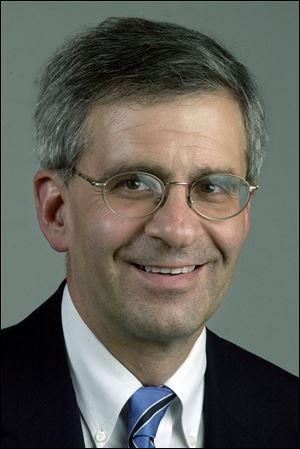
COMMENTARY
For GOP, specter of 1936 hovers over Cleveland 2016
7/20/2014
Shribman
Republicans have made a choice, and it’s the last easy one they will have for the next 23 months. They will hold their 2016 national political convention in Cleveland.
The last time they went to Cleveland, in 1936, Republicans faced a small insurgency. The establishment presidential candidate was Gov. Alf Landon of Kansas, an oil millionaire who was genial and wry. As a pillar of the Topeka business community, he was not much of a threatening figure.
The insurgent was Sen. William Borah of Idaho, an isolationist and colorful progressive known more for what he opposed than for what he favored. He was probably too old to pose a real challenge — he was born only two months after the end of the Civil War.
Mr. Landon prevailed by a large margin. He then lost to incumbent Franklin Roosevelt by an even larger margin.
This next Republican nomination struggle won’t be nearly as tranquil. For more than a third of a century, the Republican Party — commonly, but erroneously, regarded as a party at social rest — has been a cauldron of political unrest. The 2016 election will represent the sixth time in the past half-century that the GOP presidential contest will widely, and accurately, be described as a struggle for the soul of the party.
This cycle’s struggle is more complex than most. Insurgent candidates arguably will dominate establishment figures in weight — Sen. Rand Paul of Kentucky and Sen. Ted Cruz of Texas, both serious intellectual figures.
And they will dominate in decibel level — though both must compete in volume with some formidable characters, including Govs. Chris Christie of New Jersey, Scott Walker of Wisconsin, and possibly Rick Perry of Texas and John Kasich of Ohio.
A Zogby Analytics poll this month showed Mr. Paul far ahead of the pack, with 20 percent. He is followed by two establishment candidates, Mr. Christie and former Florida Gov. Jeb Bush, each with 13 percent. Such early polls are mere appetizers, with plenty of palate cleansers coming to the political table before the presidential campaign begins after this fall’s midterm elections.
Political strength is assessed in unreliable measures of amplitude and frequency, which may be why Mr. Paul scores so well. The senator is the son of former Rep. Ron Paul of Texas, who ran for president twice and gained a small but loyal cadre of followers who are attracted to his libertarian values and his willingness to attack conventional views on central banking and foreign policy.
The presence of Mr. Bush in the mix all but assures that 2016 will be another of the struggles for the soul that so delight the mainstream media, complicate Republican presidential campaigns, and at times endanger GOP nominees.
Democrats had such struggles between 1968 and 1992, when the world’s oldest political party was barred from the presidency except for the unhappy Jimmy Carter interregnum. But since the ascendancy of Bill Clinton, Democrats’ struggles have been more about personalities than about politics.
This has not been the case in the GOP, which had a small identity crisis in the early 1950s. That was resolved in 1952 by the nomination of Dwight Eisenhower over Sen. Robert Taft of Ohio. A dozen years of tranquility followed.
But tensions broke into the open in 1964 with the emergence of Sen. Barry Goldwater of Arizona. Despite their electoral success in the last third of the 20th century, Republicans had serious schisms or threats to the established order at least four other times: in 1976, 1980, 1988, and 1992.
In 1988, the struggle was between the party’s traditionalist and evangelical wings. Four years later, the party was still at war with itself, with blood feuds between those who favored tax cuts and rivals favoring spending cuts.
There were those who advocated libertarian tolerance of gay rights and abortion, and rivals arguing for religious-based opposition to both of them. In the background were swirling controversies between isolationists and internationalists, and between protectionists and free traders.
Democrats no longer have a vibrant conservative wing. Republicans have virtually no liberal wing at all. But Republicans still have the remnants of an establishment, and its personification in 2016 may be Jeb Bush.
That’s why the Cleveland convention may be no repeat of 1936, a year the Republicans in any case do not want to relive.
David Shribman is executive editor of the Pittsburgh Post-Gazette.
Contact him at: dshribman@post-gazette.com.